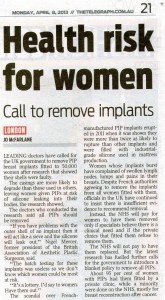BREASTSCREEN SA failed to detect 72 cancers between 2010 and 2012, due to reduced recall rates, a system-wide review into digital mammography screening has found.
The independent review, released 29/5/13, was conducted by Associate Professor Warwick Lee, BreastScreen NSW’s state radiologist, after BreastScreen SA found that 95 fewer cancers than expected were identified between 6 September 2010 and 30 June 2012.
13 radiologists reviewed 53,104 sets of digital screening mammograms and recalled 540 women for screening.
The review found 72 cancers were potentially detectable at the time of initial screening and 56 of these were found in the re-reading process. The remaining 16 were interval cancers diagnosed outside the screening program. The majority of the women who were found to have breast cancer were diagnosed in the early stages of disease.
The review found that lower than ideal recall rates were the major cause of reduced cancer detection rates, with reading practices and image quality also contributing.
29 May 2013


